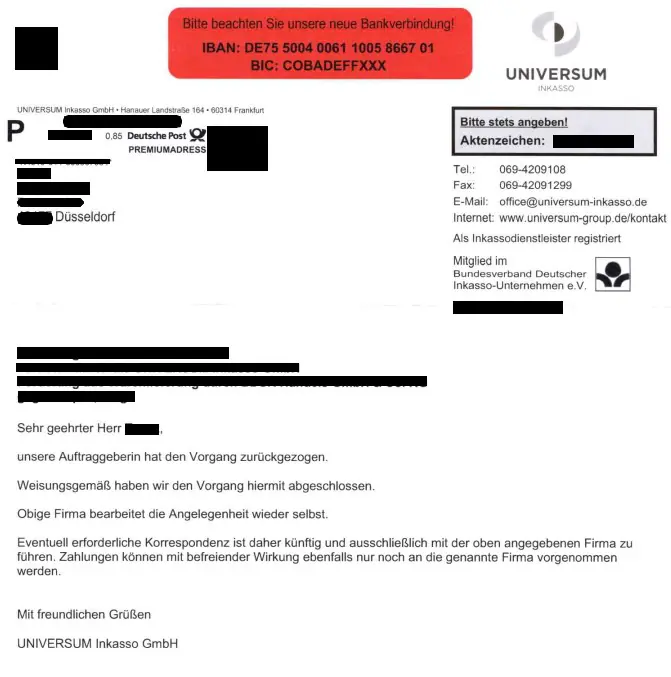Letters from debt collection agencies

-What to do?
Anyone who receives a letter from a debt collection agency usually immediately asks themselves the following question:
"Have I forgotten to pay a bill?"
A glance at the creditor of the - alleged - claim is often enough to categorise this very claim. What the affected party then has to do depends largely on whether or not they dispute the claim asserted against them.
The following article is intended to briefly explain what a debt collection agency actually is and how a letter from a debt collection agency should preferably be dealt with.
I. Definition of Terms
For a better understanding, the following terms should be explained in advance:
–Schuldner: Ein Schuldner ist eine Person, die einem anderen etwas schuldet.
–Gläubiger: Ein Gläubiger ist eine Person, welchem eine Forderung gegen einen anderen zusteht.
–Abtretung: Unter einer Abtretung ist die (dingliche) Übertragung einer Forderung zu verstehen.
Here is a case study:
Max Mustermann (Gläubiger) „leiht“ seinem besten Freund Hans Schmidt (Schuldner) EUR 1.000,00 (Forderung), welches er auf das Girokonto von Hans überweist.
Hans (Schuldner) kann die EUR 1.000,00 nicht sofort zurückzahlen, hat jedoch selbst eine Forderung in gleicher Höhe gegen seinen Arbeitskollegen Stefan Müller.
Hans (debtor) and Max (creditor) agree that Hans will transfer his claim against Stefan to Max (assignment) in order to free himself from his debt to Max.
II. What is a debt collection agency?
Führt man sich das obige Fallbeispiel vor Augen, so macht ein Inkassounternehmen nichts anderes, als Forderungen von Gläubigern gewerblich „abzukaufen“ und diese im eigenen Namen gegen den jeweiligen Schuldner durchzusetzen.
Das Inkassounternehmen verdient unter anderem dadurch Geld, dass sie die jeweilige Forderung des Gläubigers zu einem niedrigeren Preis „einkauft“, als der Nennbetrag der jeweiligen Forderung eigentlich ist.
Example:
Die Forderung des Gläubigers entspricht EUR 1.000,00. Das Inkassounternehmen zahlt dem Gläubiger EUR 950,00 aus und treibt beim Schuldner unter anderem die EUR 1.000,00 ein.
Des Weiteren erhebt das Inkassounternehmen bei der Durchsetzung der jeweiligen Forderung zudem Gebühren, die sie – neben der eigentlichen Forderung – zusätzlich vom Schuldner der fälligen Forderung einfordert.
Des Weiteren enthalten Briefe von Inkassounternehmen, „Hinweise“ darauf, dass Schufa-Einträge erfolgen können, sollte die geltend gemachte Forderung nicht beglichen werden. Durch diese „Hinweise“ erhoffen sich die Inkassounternehmen, dass die jeweiligen „Schuldner“ in Bezug auf die eigene Kreditwürdigkeit verängstigt werden und vorschnell die geforderte Summe zahlen.
III What to do if you receive a debt collection letter?
Das weitere Vorgehen nach Erhalt eines Schreibens (Briefes) eines Inkassounternehmens hängt maßgeblich davon ab, ob der jeweilige Betroffene die streitgegenständliche Forderung für begründet hält oder nicht.
1. existing or undisputed claim
Hält der jeweilige Betroffene die streitgegenständliche Forderung für existent und begründet, so bietet es sich in der Regel an, die streitgegenständliche Forderung zu bezahlen, sofern dem jeweiligen Betroffenen keinerlei Gegenrechte gegen die streitgegenständliche Forderung zustehen.
An example:
The debtor is the tenant of a flat and has not paid one month's rent. The flat in which the debtor lives for rent has no defects.
In diesem Beispielsfall ist dem Schuldner zu raten, schnellstmöglich die Forderung zu begleichen, um weitere Kosten zu vermeiden.
The procedure would be different if the affected party were entitled to any counter-rights, on the basis of which the subsidy in question could be regarded as partially or completely non-existent or justified.
Modification of the example case:
Der Schuldner ist Mieter einer Wohnung und hat eine Monatsmiete nicht gezahlt. Die Wohnung, in welcher der Schuldner zur Miete wohnt, hatte einen Wasserschaden und ist unbewohnbar. Von Gesetzes wegen führt dies für die Dauer der Unbewohnbarkeit der Wohnung zu einer Minderung der monatlichen Mietschuld auf EUR 0,00.
In the modified example case, the debtor would be advised not to make any payments to either the landlord or the debt collection agency. Although the landlord is basically entitled to payment of the agreed monthly rent, this is reduced to zero by law (ipso iure) for the duration of the uninhabitability of the flat. If the landlord carelessly calls in a debt collection agency, the landlord's declaration of assignment in this regard will be in vain due to the lack of existence of the claim.
2. non-existent or disputed claim
If the affected party disputes the existence of the claim in dispute on the merits, for example because no valid contract has been concluded at all, it is generally advisable not to make any payments.
Der Betroffene darf nicht dem Irrtum anheimfallen, dass etwa ein negativer Schufa-Eintrag drohen und dadurch die eigene Kreditwürdigkeit herabgesenkt werden könnte, wenn keine Zahlung vorgenommen wird.
Ein Schufa-Eintrag ist bei bestrittenen Forderungen unzulässig. Der jeweilige Betroffene kann von der Schufa die unverzügliche Löschung der Eintragung verlangen, notfalls sogar mithilfe einer einstweiligen Verfügung des zuständigen Gerichts.
IV. Our experience with debt collection agencies
1. reputable creditors work through debt collection agencies
Our experience to date has shown us that "dubious" creditors in particular are simply attracted to debt collection agencies.
Gerade in Fällen, in denen ein Vertragsschluss zwischen den jeweiligen Parteien im Streit steht, schalten bestimmte Gläubiger systematisch erstmal ein Inkassounternehmen ein, um die vermeintliche Forderung durchsetzen.
If the affected party then continues to defend themselves against the claim in dispute, they suddenly give up.
Here is an example from business practice:

This approach by dubious creditors is due to the fact that they understandably shy away from the costs of a legal dispute before a German court. If they lose the legal dispute, they would not only have to pay the court costs, but also the other party's legal fees. From the point of view of dubious creditors, co-operation with a debt collection agency is usually cheaper, easier and faster.
2. no response
It is not uncommon for us as a law firm to receive no feedback from either the creditor or the debt collection agency after we have appointed ourselves for an affected party and, for example, disputed the claim in dispute on behalf of the client.
This often has the advantage for the affected party that the matter effectively settles itself.
V. Conclusion
We can only advise affected parties not to make any payments to debt collection agencies prematurely and instead to seek legal advice in good time.
This applies in particular to cases in which the affected parties dispute the claim on the merits or are of the opinion that they are not obliged to pay due to counterclaims (set-off, cancellation, termination, revocation, rescission, etc.).
Ein drohender negativer Schufa-Eintrag ist kein Grund für eine vorschnelle Zahlung, wenn es sich, wie bereits erwähnt, um eine bestrittene Forderung handelt.
Tolga Topuz
Lawyer
Topuz Law –Kanzlei aus Düsseldorf–
